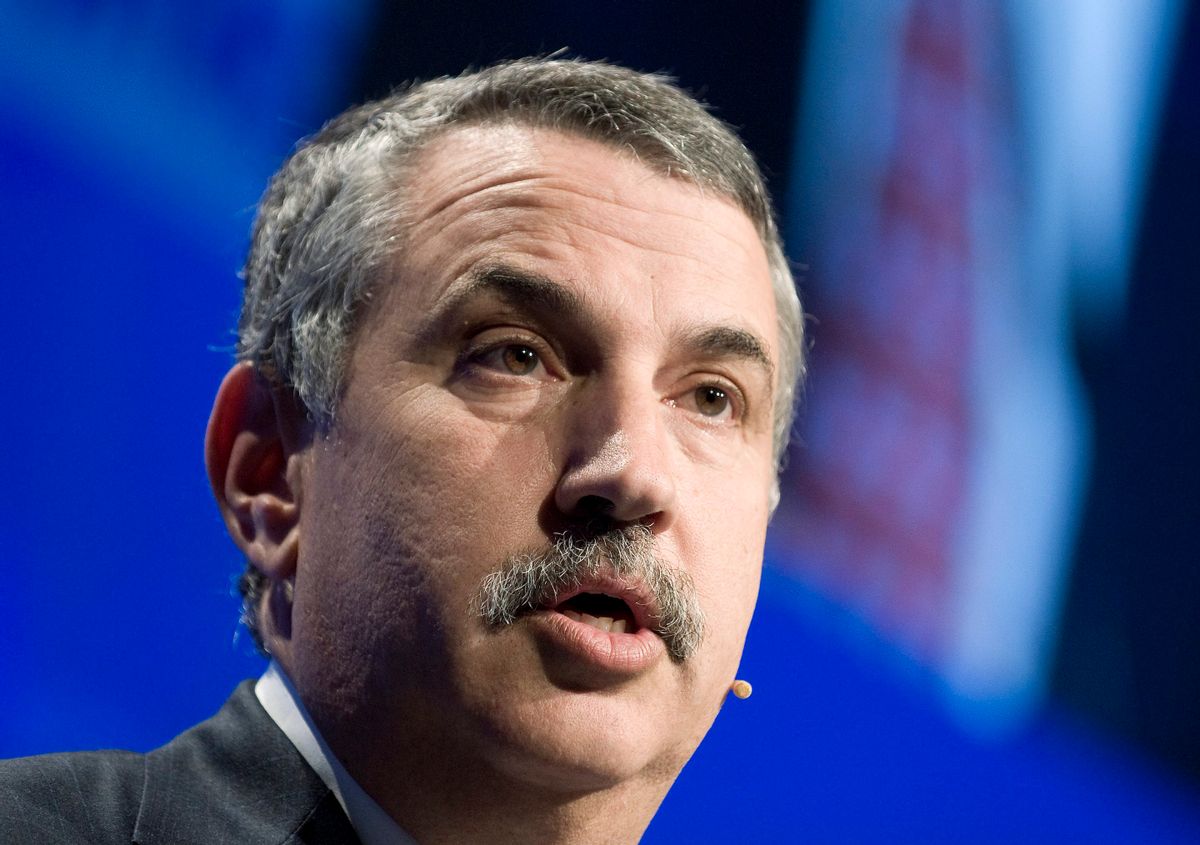"I hate Keystone," Thomas Friedman writes in his latest column for the New York Times, acknowledging that he'd prefer President Obama not approve a pipeline that will facilitate the extraction of dirty oil from Canada's tar sands. He makes that concession, however, only after putting forward the "crazy" (his words) proposition that the president do just that:
Obama should summon the congressional leadership to Camp David and put his own plan on the table: Offer the Republicans the Keystone XL pipeline, expanded oil drilling and fracking (but only at the highest environmental standards) and, in return, demand a revenue-neutral carbon tax, a national renewable portfolio standard that would require every utility in America to gradually introduce more renewable power, and a national California-level home building code for energy efficiency. I would also toss in incentives for expanding the share of nuclear power in our energy mix.
Never mind that fracking "at the highest environmental standards," if such a thing is even possible, could only be achieved if we slowed down the current breakneck pace of drilling. Or that the process of liquifying the natural gas derived from fracking in order to export it is more carbon intensive than keeping it for domestic use. Because even if such a deal were possible in our divided Congress, it vastly underestimates the climate crisis -- a crisis that the Obama administration laid out in its starkest ever terms Tuesday, with the release of the third National Climate Assessment. The bigger problem is the suggestion that Keystone XL, or anything else that can significantly worsen climate change, is worth trading.
"We've waited so long to take action on climate change that we now have to do pretty much everything right," Bill McKibben, the founder of 350.org and one of the most vocal anti-Keystone opponents, told Salon, when asked how he felt about the idea of the pipeline being used as a bargaining chip. "There's not much room for bargaining left."
Friedman "is correct that a price on carbon, if it was going to do any good, would have to be set high enough to keep tar sands oil, and a great deal else, in the ground," McKibben continued. That, of course, is the same thing anti-Keystone activists are attempting to accomplish.
The cost of tapping Canada's tar sands, meanwhile, is far from trivial. "The tar sands are a huge source of carbon," McKibben reiterated, "one of seven or eight around the world. We're doing our best to fight on all of them. But if you took all the economically recoverable oil out of Alberta, you'd add more than 100 parts per million carbon to the atmosphere." To put that in context, McKibben's group is named for the coal of keeping atmospheric CO2 levels at 350 ppm -- this year, they exceeded 400 ppm for the entire month of April.
But the real problem with Friedman's Faustian bargain is that, contrary to what he suggests, it's unlikely to improve the president's image. Friedman depicts Putin as taunting Obama -- "He thinks the Americans will never be serious about energy" -- and suggests that making this sort of deal presents the president with "an ideal legacy leadership opportunity." It's true that Obama isn't perceived as being serious about energy. McKibben points to a Washington Post column by Dana Milbank, also printed Wednesday, which highlights the underlying contradiction of the administration's climate push: The president is talking more than ever about the urgency of fighting climate change from a scientific perspective, while at the same time pursuing an "all-of-the-above" energy policy that embraces the very source of the problem. Embracing even more oil and gas production will only deepen this hypocrisy.
"Even from a purely political point of view," McKibben added, "the only way we'll ever get a price on carbon is if we break the power of the fossil fuel lobby -- and Keystone's significance includes that as well. Along with divestment, it's one of the few times the movement has ever really stood up to these guys."
Not to mention that there's an additional realm of international diplomacy in which Obama must avoid appearing weak. "There's enormous significance in the potential of a world leader actually saying: 'Here's something we're not going to do because of its effect on climate,'" McKibben said. "If Obama turns down Keystone XL, he will dramatically change the equation heading into the next international climate talks in Paris," when the world's leaders will come together to reach a legally binding agreement to reduce greenhouse gases.



Shares